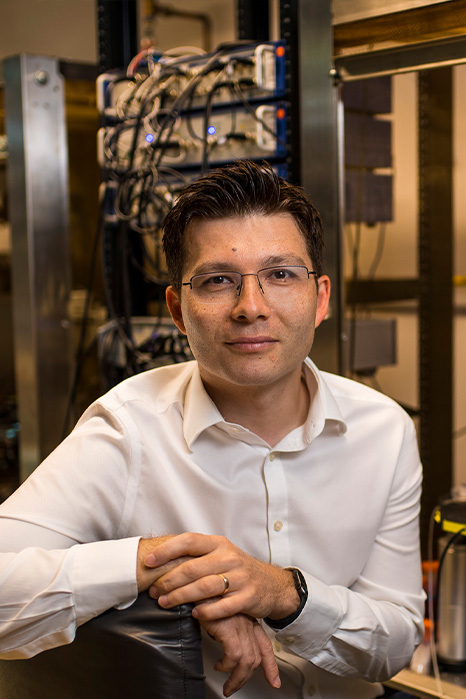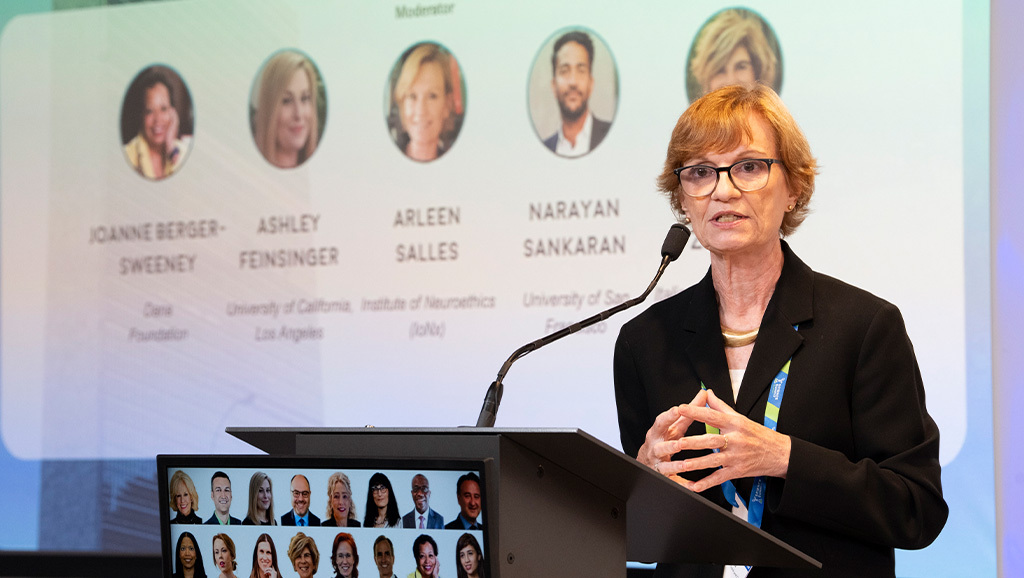News & Insights
Building the Future of Human Neuroscience
A conversation with Sergiu Pasca


Advances in stem-cell research are expanding the frontiers of neuroscience, with neural organoids—3D clusters of brain-like tissue grown from human stem cells—opening new windows into how the brain develops and why certain diseases arise. At Stanford University’s School of Medicine, Sergiu Pasca, M.D., and his team are advancing these models to map brain circuitry and study conditions such as autism and rare genetic syndromes.
While these breakthroughs show great promise, they also raise questions that extend far beyond the lab: Could complex models ever show signs of awareness or pain? How should scientists communicate about advances in these models accurately and responsibly?


During a recent visit to the Dana Foundation’s office in New York City, Pasca sat down with Dana’s president, Caroline Montojo, for a filmed interview that further explores these questions. The latest episode of NeuroSociety Stories, now available on YouTube, offers a thoughtful look at both the potential and responsibilities of this rapidly evolving field, emphasizing the need for clear, ethical standards as neural organoid and assembloid research grows more sophisticated.
Meeting these challenges requires more than technical expertise, Pasca says. It calls for dialogue across disciplines and with patients, and a shared ethical framework that keeps pace with discovery. From sourcing patient-derived cells to anticipating the capabilities of highly complex models, the field must balance innovation with thoughtful self-governance. “Psychiatric disorders bring immense suffering,” he says. “We have to think about what the goal is for most of this technology and how we’re going to actually deploy it.”
That perspective is also at the heart of an upcoming meeting he is co-organizing at the Asilomar Conference Grounds with Stanford colleague Hank Greely, J.D., director of the Center for Law and the Biosciences.
Supported by the Dana Foundation, the in-person gathering for “The Ethical and Societal Implications of Neural Organoids, Assembloids, and their Transplantation” will take place November 10–12, 2025, bringing together scientists, ethicists, policymakers, communicators, and families affected by brain disorders to shape thoughtful guidance for the future of neural organoid research. “Our goal was really to bring everybody together first and have a healthy conversation about the real issues,” Pasca says.
Looking to the future, Pasca spoke with optimism about the next generation of neuroscientists, encouraging students to embrace the field’s convergence of biology, technology, and philosophy. “There’s never been a better time to study neuroscience,” he said—advice featured in a bonus clip here:
Watch the full interview below to hear more about Pasca’s groundbreaking work, his vision for ethical innovation, and how collaboration across science and society can unlock new understanding of the human brain.
FULL TRANSCRIPT:
[Intro Music]
CAROLINE MONTOJO, HOST: Welcome to NeuroSociety Stories, a series created by the Dana Foundation that explores the incredible ways that neuroscience is shaping society. Through engaging conversations, we invite Dana Foundation grantees, partners, and other neuroscience and society thought leaders to share stories of discovery, innovation, and impact. Each episode offers unique perspectives on how brain science intersects with fields such as ethics, law, social sciences, and more—advancing neuroscience for the good of all.
I’m Caroline Montojo, President and CEO of the Dana Foundation. Join us as we uncover how neuroscience can drive change, inspire new possibilities, and create a future that reflects the aspirations of all people.
MONTOJO: Today I am delighted to welcome world-renowned neuroscientist Dr. Sergiu Pasca. He was trained as a physician in Romania, and he’s now a professor of psychiatry and behavior at Stanford University. He’s also the director of the Stanford Brain Organogenesis Center. Sergiu and his lab have played a key role in the development and use of neural organoids—3D clusters of brain-like cells grown from human stem cells. Sergiu and his team are pioneering new uses of neural organoids and assembloids to better understand human brain development, psychiatric conditions, and potential therapeutics.
We’re also delighted to talk with Sergiu today about his interest in the ethical and societal questions posed by this area of research, as well as new strategies for charting a future of responsible innovation and science communication on neural organoids. Sergiu, welcome to NeuroSociety Stories.
SERGIU PASCA: Thank you so much. It’s great to be here.
MONTOJO: You’ve said that your interest in neural organoids began as a way to understand the brain outside of the human body. Can you take us back to that moment? What drew you in, and did you ever imagine that the field would grow as rapidly as it has?
PASCA: Initially, I was just puzzled for a while, and my approach really was to try to measure anything biological in this condition. So I studied what changes are taking place in the blood of patients with autism. Autism remains my main clinical expertise. And then suddenly, as I was finishing my clinical training, I heard of this remarkable discovery that a Japanese scientist made, showing that you could actually take skin cells—or any somatic cells—turn them back in time to become stem cells, pluripotent stem cells. And of course, pluripotent stem cells can become any other cell types. So then the idea was immediately: could we actually, in a non-invasive way, without taking a biopsy, without doing anything to patients, just turn skin cells into neurons and study the biology of those psychiatric disorders outside of the human body?
And so I really dropped even the clinical training that I was doing at the time and moved to the United States. I came to Stanford, where I developed, soon after in the next few years, some of the first neurons that were derived from patients with neurodevelopmental disorders. That really unleashed so many possibilities. And of course, over the past 15 years, we’ve been building ever more complex models of the human brain outside of the human body with the clear intent of understanding the biology of psychiatric disorders and really demystifying them so that we can ultimately find effective therapeutics.
MONTOJO: That’s incredible. It’s wonderful to hear that story of how you first discovered this area and then translated it into neuroscience. You were thinking about ethics long before neural organoids started to get combined into assembloids, and before they were transplanted into animals. How did your interest in ethics and philosophy shape the way that you approach your work?
PASCA: I think all neuroscientists are interested at some level in philosophy—for instance, in the philosophy of mind: how does the mind arise out of the brain? It became very clear, especially for us in psychiatry, that understanding the biological basis of how mental processes arise out of circuits remains a fundamental question. And then, of course, I came back to that as we were building some of these models outside of the human brain, and some of the questions arose naturally.
There was also a much more pragmatic aspect of it. We’re using human cells that we’re obtaining from patients with consent, and so we have to be responsible in the use of those cells. The convergence of these issues sensitized us very early on to questions that are now much more prominent.
MONTOJO: We’re now at a point where you can watch neurons develop in a dish. Can you share what kinds of possibilities this opens up and what are some of the biggest ethical questions that arise from these breakthroughs?
PASCA: In the beginning, most of the cultures derived from these pluripotent stem cells were rather simplistic—two-dimensional, sitting at the bottom of a plate. We realized very quickly that in order to understand some of these complex psychiatric disorders, we would need to gain access to later stages of development when the brain starts to assemble itself and form the circuits critical for brain function.
We embarked on this journey by first seeing how many cell types we could make in the brain. There are more than 2,000, but now we’re in a very good position to generate many of the cell types in the nervous system. Then we learned that most cells in the nervous system don’t stay in the place where they’re born but often move very long distances. So we started to create preparations—this was the first actual assembloid—where you make two brain regions, and some of the cells move from one to the other. We put them in close proximity, and it turns out the cells know what to do.
We began to combine more than two parts together to see how the cells connect with each other. What we discovered, remarkably, is that to a large extent, the cells know what to do—they come with instructions and start to form circuits on their own. For instance, you can rebuild the entire corticospinal circuit by putting together a cortex, a spinal cord, and a ball of human muscle. The muscle will start to contract in a dish once you put them together. This speaks to how remarkable the assembly of the human brain is.
Now, about the ethical issues: it became clear to many of us in the neuroscience community that human brain disorders have a strong human component. So it’s clear that we need to access the human brain and recreate some of its circuits. But the closer we get to it, the more ethical issues arise.
On one hand, there are the issues of the source of the cells—obtained from individuals under consent, with limitations on what can be done with them. Then there are issues about how complex these preparations are becoming. If an assembloid becomes really complex, could it have new emergent properties? Could it be sentient? That’s one of the issues being discussed broadly right now.
There are also concerns about transplanting cells into animals and the welfare of those animals. All these issues must be put into context: why are we doing this work? Psychiatric disorders bring immense suffering. One in four individuals suffers from a brain disorder worldwide, and yet we’re not making much progress in finding effective therapeutics. We have to think about what the goal is for this technology and how we’re going to deploy it.
MONTOJO: You have called for a shared ethical framework around this new frontier of neuroscience—one that balances both responsibility and innovation. Can you share your thoughts on what a healthy field culture would look like?
PASCA: We realized early on that even what we call these preparations is important. If we trivialize what we’ve made and call them “mini brains,” that will only confuse the public. So the first step was to get together with a larger group of experts around the world and agree on accurate terminology. The second step was to bring together a larger consortium and discuss field standards, so that when we talk about experiments, we’re all referring to the same types of experiments.
Now that we’ve clarified terms and conditions, we should start thinking about the real ethical issues arising as these experiments are conducted worldwide. Our center at Stanford has helped more than 350 labs implement these technologies. The need is immense, because for the first time we can ask questions not only about how the human brain develops or what makes it unique, but also how disorders arise and how to develop therapeutics.
This is a prime time for bringing together not only experts but also philosophers, ethicists, legal scholars, journalists, science communicators, and parents of patients who have a stake in how this technology is used—and to discuss openly what that framework should be moving forward. That’s why it’s so exciting to partner with the Dana Foundation in this effort later this year.
MONTOJO: That sounds like a very healthy field culture, with all of these different people coming around the table to talk with each other about what the future of neuroscience can look like. I’d love to hear more about what this future Asilomar conference you’re organizing will look like and how you hope it will shape the field.
PASCA: Our goal was really to bring everybody together and have a healthy conversation about the real issues. Our hope is to present an overview of the science as it stands today, bringing experts in neural organoids, assembloids, and their transplantation. We’ll also have philosophers, journalists, legal scholars, and sociologists of religion. Our goal is to bring broad perspectives and identify key issues.
At the same time, we’ll engage scientific organizations such as the Society for Neuroscience to help us build a broader framework for the entire field.
MONTOJO: And I think you also had mentioned the inclusion of patient groups. Can you give us a sense of the different patients and families that you’re bringing into these discussions?
PASCA: Absolutely. From early on, we noticed that parents—especially those of children with neurodevelopmental disorders such as autism and intellectual disability—are very engaged. Parents would love for us to develop therapeutics with this technology, but they’re also aware of how it will transform the field in the next decade. So we have to think seriously about the ethical issues that may arise and create the right framework for the field to progress in a healthy way. Parents of patients are key to this conversation.
MONTOJO: You’ve shared how far this field has come over such a short period of time. Can you share your outlook on where it’s going and its potential in therapeutics?
PASCA: It’s important to think about the potential of the field. Take the example of a rare form of autism called Timothy syndrome, which we’ve been studying for 15 years. There are only about 20–30 patients worldwide, but this disorder is giving us key insights into how we could develop a therapeutic using this platform. Over the past few years, we’ve developed a first therapeutic for this condition that we hope to move into clinical trials early next year. This will be the first therapeutic for a psychiatric disease developed exclusively with human stem cell models. It may fail—this is just the first disease—but we will not stop. This is the best of times to study human neuroscience and to understand the biology of complex disorders and find therapeutics.
MONTOJO: It’s wonderful to hear about your outlook for potential therapeutics using neural organoids as a model. That’s exactly what we are interested in here at the Dana Foundation under our Neuroscience and Society mission. We hope to seed new projects, programs, and people interested in education, training, and bidirectional public engagement on Neuroscience and Society issues like neural organoids or brain-computer interfaces. It’s wonderful to see that connection of neuroscience being studied in the lab and then thinking about that bridge into how it can positively impact people’s lives. So thank you so much for the work that you do.
PASCA: Thank you. I look at it as more of a convergence, because I think really partnering with the expertise at the Dana Foundation is key as we move forward in this field.
MONTOJO: Sergiu, this has been an incredibly fascinating conversation. I’ve heard you talk about your research with neural organoids, assembloids, and their potential to really help those with psychiatric conditions. Every single time I talk to you, it feels like the field has leaped forward multiple steps. I want to thank you for being so intentional and thoughtful about the ethical and societal questions that arise from this work. I’m also looking forward to the Asilomar conference that you’re organizing and all of the outcomes that come from it—because it’s so unique how you’re bringing together people from many different fields, as well as patients and their families, to chart that path forward. Thank you for your work.
PASCA: Thank you so much.


